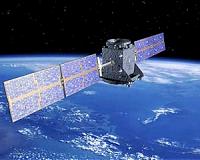 |
Brussels (AFP) Jan 6, 2010 The European Commission will on Thursday award Germany's OHB Technology a contract for at least eight satellites for its Galileo satnav system, dealing a blow to rival EADS Astrium, an industry source said. "We havent heard yet if its eight or 14 satellites," said Philip Davies, a senior official at Surrey Satellite Technology (SSTL) Ltd, British partner of OHB in the bid. "I am 100 percent sure it will be OHB which will be chosen tomorrow," said Davies, whose company is an offshoot of Surrey University. Such a decision would be a blow to European aerospace giant EADS which led its own Galileo bidding group including Thales Alenia Space. The satellite network is meant to challenge the dominance of the US-built Global Positioning System (GPS) which is widely used in navigation devices. The EU aims to have the network up in space by 2013. The EU has struggled to secure financing for the project, originally put at 3.4 billion euros (5.4 billion dollars), and has had to tap unused funds from the bloc's massive agricultural budget. The economic crisis has also cut the planned number of satellites from 26 to 22. The project has been divided into six sections and on Thursday Brussels will announce the winners of three contracts -- satellite construction, launchers and support systems. OHB, much smaller than rival Astrium, battled hard to secure the satellite contract and the two will do battle at a later stage for the remaining satellites. According to the bidding rules, contracts for eight satellites could run no higher than 400 million euros and 680 million euros for 14. Since the launch of the bidding process, EADS has taken over Surrey Satellite Technology so it will not be completely be left out in the cold. Europe's Arianespace hopes to secure the satellite launchers contract. Last year, the European Court of Auditors criticised the Galileo project as ill-prepared and badly managed. The Galileo Joint Undertaking, tasked with supervising the project's technological development activities, was set up in 2003 but scrapped in 2006. While test satellites have been launched none of Galileo's operational satellites have been put in space yet. The project was the first close collaboration between the European Space Agency (ESA) and the commission on such a large space programme. It was also the first industrial project to be managed at European level and the first time the commission was to participate in a public-private partnership scheme.
Share This Article With Planet Earth
Related Links GPS Applications, Technology and Suppliers
 GIOVE-A Marks Four Years In Orbit Testing Europe's GPS Galileo Platform
GIOVE-A Marks Four Years In Orbit Testing Europe's GPS Galileo PlatformGuildford, UK (SPX) Dec 28, 2009 Surrey Satellite Technology Ltd (SSTL) is today celebrating the 4th anniversary of the launch of its historic GIOVE-A satellite - the first step in Europe's visionary Galileo satellite navigation programme - on December 28th 2005. During the past 4 years, SSTL and GIOVE-A have contributed significantly to the testing and validation of technologies vital to the now imminent operational constellat ... read more |
|
| The content herein, unless otherwise known to be public domain, are Copyright 1995-2009 - SpaceDaily. AFP and UPI Wire Stories are copyright Agence France-Presse and United Press International. ESA Portal Reports are copyright European Space Agency. All NASA sourced material is public domain. Additional copyrights may apply in whole or part to other bona fide parties. Advertising does not imply endorsement,agreement or approval of any opinions, statements or information provided by SpaceDaily on any Web page published or hosted by SpaceDaily. Privacy Statement |